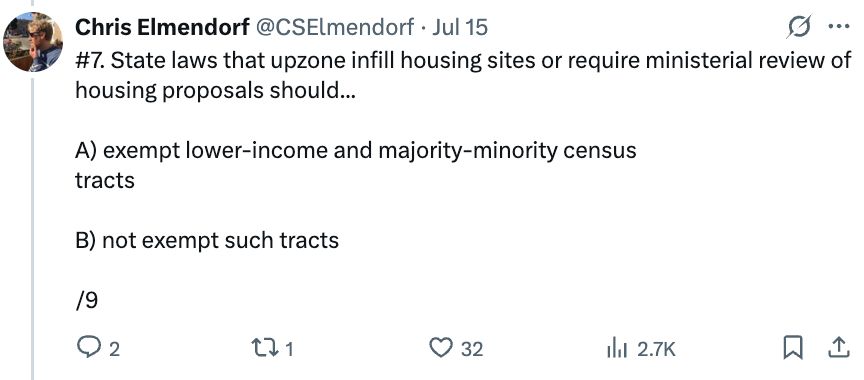
@ucdavislaw.bsky.social students today w/ the story of California's builder's remedy.
Especially b/c I got to feature my former students Jordan Wright & Marissa Fuentes!




@ucdavislaw.bsky.social students today w/ the story of California's builder's remedy.
Especially b/c I got to feature my former students Jordan Wright & Marissa Fuentes!



job-boards.greenhouse.io/socialscienc...
1/2

job-boards.greenhouse.io/socialscienc...
1/2
@vincent-rollet.bsky.social


@vincent-rollet.bsky.social

(If there's no limits, cities that don't want apartments well set rents at $0.)

(If there's no limits, cities that don't want apartments well set rents at $0.)


2B is a plausible alternative, building on idea of a rent registry and addressing concerns about asymmetric info b/t landlords & tenants (it also polls well)

2B is a plausible alternative, building on idea of a rent registry and addressing concerns about asymmetric info b/t landlords & tenants (it also polls well)
Too limited to geographically small projects to be of much use? Or genuinely helpful?

Too limited to geographically small projects to be of much use? Or genuinely helpful?

That paragraph was actually in the official bill analysis of Sen. Wiener's...


That paragraph was actually in the official bill analysis of Sen. Wiener's...
@volts.wtf interviews @scottwiener.bsky.social & @buffywicks.bsky.social on CEQA reform.
This is a must-listen for anyone who considers themselves an enviro or a progressive. Dave is as green & progressive as they come and he asks all the right questions.
(link in next post)

@volts.wtf interviews @scottwiener.bsky.social & @buffywicks.bsky.social on CEQA reform.
This is a must-listen for anyone who considers themselves an enviro or a progressive. Dave is as green & progressive as they come and he asks all the right questions.
(link in next post)
And even if they're left as-is, I would be pretty surprised if a court read the terms "will" (in PRC 21064) and "more likely than not" (in PRC 21064.1) as referring to probabilities of impact.
/end

And even if they're left as-is, I would be pretty surprised if a court read the terms "will" (in PRC 21064) and "more likely than not" (in PRC 21064.1) as referring to probabilities of impact.
/end
That's clearly not the author's intent either.
/11

That's clearly not the author's intent either.
/11
(because it says, “may have a significant effect on the environment” means ... more likely than not ...")
/9

(because it says, “may have a significant effect on the environment” means ... more likely than not ...")
/9
Their "significance" should be cashed out in expected-value terms: EV(impact) = P(impact) * V(impact), w/ P() representing probability and V(), value.
/7


Their "significance" should be cashed out in expected-value terms: EV(impact) = P(impact) * V(impact), w/ P() representing probability and V(), value.
/7
Under his bill, a neg dec would just require a finding based on substantial evidence that the proposed project "will not have a significant effect on the env't and does not require preparation of an EIR."
/6

Under his bill, a neg dec would just require a finding based on substantial evidence that the proposed project "will not have a significant effect on the env't and does not require preparation of an EIR."
/6
/3

/3
I was initially dismissive of his concern, but on reflection I think there's something to it. Fortunately, there's an easy fix.
🧵/17

I was initially dismissive of his concern, but on reflection I think there's something to it. Fortunately, there's an easy fix.
🧵/17
2/3

2/3
And he would go further!
1/3


And he would go further!
1/3
1/2

1/2

